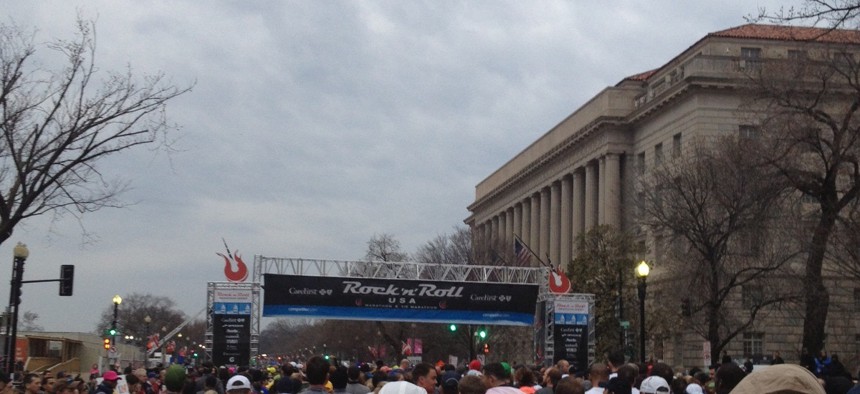
The Rock N' Roll Marathon gets underway the morning of March 16 under threatening skies on Constitution Ave in Washington, D.C. The Department of Commerce building is at right. SHFWire photo by Matt Nelson
Ten Years Later, a Marathon Runner
From fat kid to marathoner, a writer shares lessons learned by hitting the road running.
If you're going to run in Minnesota, do it in the summer. In fact, if you're going to do anything in Minnesota, do it in the summer.
Except for ice fishing. You might drown.
You can run in spring, too. Just wait for that glorious first day when the temperature jumps above 40 and the sun is shining. That's what the weather was like the first day I went running.
I was quite the racer. Picture a fat kid with glasses lugging a backpack. He's decided to run in khaki pants and tennis shoes. He knows that isn't proper running attire, but he isn't sure what is, and in 2003, all he's got is dial-up Internet.
But this kid has an ace up his sleeve — he lives on a dirt road outside of town. He's confident no one can see him. He thinks about going up to the farmhouse to drop off his backpack (and maybe change into shorts), but he's afraid that he won't work up the determination to come back to the end of the driveway. If this first run is going to happen, it has to happen now.
At the end of the dirt road, he sees a stop sign. It is a half-mile away. He's never gone that far, but when he goes to high school in six months, he'll have to run twice that. That's why he's left his backpack at the side of the road and is awkwardly stretching his legs by the mailbox. He's afraid.
He takes a few breaths, throws out his arms — and begins to run!
Ten years later, that kid has become me — a three-time marathon runner who recently nailed a personal best of 3 hours and 41 minutes in the D.C. Rock 'N Roll Marathon.
But that first day, I ran about 200 feet. My heart was pounding so hard I had to sit at the side of the road (my khaki pants got dirty). The horses lined up behind the fence to watch me. They had judging eyes. Their whinnies mocked my wheezes. I gazed down the road at the stop sign, so small. So far away.
I've been asked what it feels like to run a marathon. I assume people want to hear about the sense of accomplishment, rather than the bleeding, chafing and other things they can learn about through Google. And the truth is, that as as proud as 26.2 miles makes you feel, it's just a cap on a series of victories that have so much more meaning.
Touching the stop sign 10 years ago — that was my first real running triumph. It had taken me the rest of the school year and half of the summer. Every day I ran a bit farther, sometimes as little as a few steps.
There were no crowds at the end of Foss Road pumping their fists to congratulate me, but the mosquitoes seemed excited enough.
It seems so small now, but if I hadn't touched that sign, I would not have run a marathon. That's how I learned that the toughest barriers to running were in my mind, not my muscles. The white letters said STOP, but I thought, why?
So I ran more. I ran my first marathon in 2008. I was OK until mile 25, when I thought about the stop sign. I started choking up. That's how I learned that a weepy, sweaty mess does not make a good finish line picture. Always smile.
I trained consistently and rigorously for the marathon last month. I lost quite a bit along the way, including 30 pounds and two wisdom teeth (I ran a total of 31 miles the weekend I had them taken out — prescription painkillers are great!). But I found a lot of things, too — the friends I made at run club, the wooded Beach Drive going miles into Maryland.
As far as marathons go, the Rock 'N Roll was fine — although I could have done with fewer acoustic Lady Gaga covers from the live bands along the route. I'm happy with my pace, and I've got a plan to keep cutting it down.
Ten years later, and I'm gazing at a starting line, not a stop sign: Boston, 2014. To get there, I'll need to run a minimum qualifying time of 3 hours and 5 minutes. The line is far away, hard to see.
I started on a dirt road by a mailbox. Now I'm at the Washington Monument. I'm stretching my legs, taking a few breaths, getting ready to run. I'm not afraid any more.
Here I come!
NEXT STORY: OMB Updates Budget Caps Under Sequester Law






